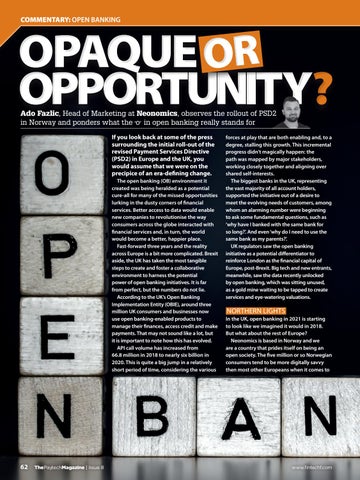COMMENTARY: OPEN BANKING
OPAQUE OR OPPORTUNITY? Ado Fazlic, Head of Marketing at Neonomics, observes the rollout of PSD2 in Norway and ponders what the ‘o’ in open banking really stands for If you look back at some of the press surrounding the initial roll-out of the revised Payment Services Directive (PSD2) in Europe and the UK, you would assume that we were on the precipice of an era-defining change. The open banking (OB) environment it created was being heralded as a potential cure-all for many of the missed opportunities lurking in the dusty corners of financial services. Better access to data would enable new companies to revolutionise the way consumers across the globe interacted with financial services and, in turn, the world would become a better, happier place. Fast-forward three years and the reality across Europe is a bit more complicated. Brexit aside, the UK has taken the most tangible steps to create and foster a collaborative environment to harness the potential power of open banking initiatives. It is far from perfect, but the numbers do not lie. According to the UK’s Open Banking Implementation Entity (OBIE), around three million UK consumers and businesses now use open banking-enabled products to manage their finances, access credit and make payments. That may not sound like a lot, but it is important to note how this has evolved. API call volume has increased from 66.8 million in 2018 to nearly six billion in 2020. This is quite a big jump in a relatively short period of time, considering the various
62
ThePaytechMagazine | Issue 8
forces at play that are both enabling and, to a degree, stalling this growth. This incremental progress didn’t magically happen: the path was mapped by major stakeholders, working closely together and aligning over shared self-interests. The biggest banks in the UK, representing the vast majority of all account holders, supported the initiative out of a desire to meet the evolving needs of customers, among whom an alarming number were beginning to ask some fundamental questions, such as ‘why have I banked with the same bank for so long?’. And even ‘why do I need to use the same bank as my parents?’. UK regulators saw the open banking initiative as a potential differentiator to reinforce London as the financial capital of Europe, post-Brexit. Big tech and new entrants, meanwhile, saw the data recently unlocked by open banking, which was sitting unused, as a gold mine waiting to be tapped to create services and eye-watering valuations.
NORTHERN LIGHTS In the UK, open banking in 2021 is starting to look like we imagined it would in 2018. But what about the rest of Europe? Neonomics is based in Norway and we are a country that prides itself on being an open society. The five million or so Norwegian consumers tend to be more digitally savvy then most other Europeans when it comes to
www.fintechf.com































